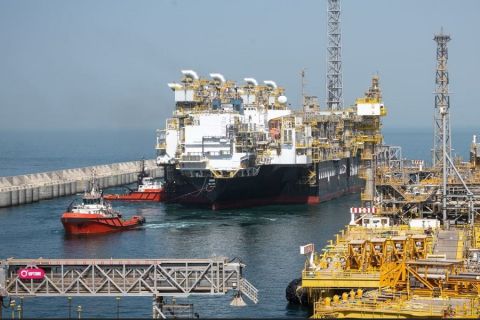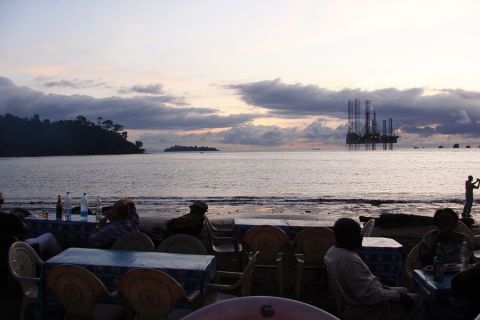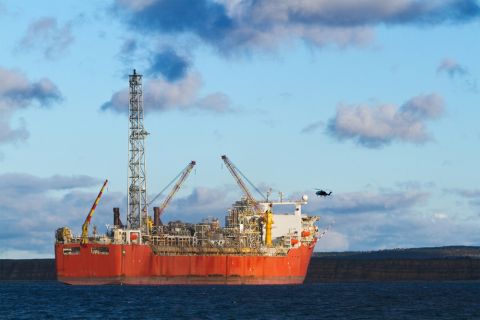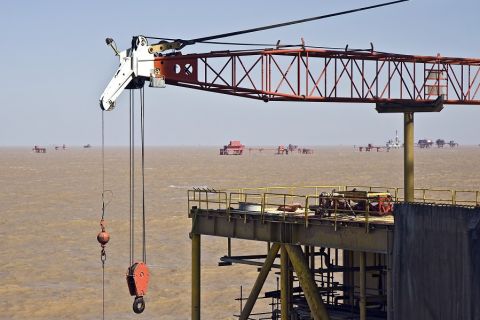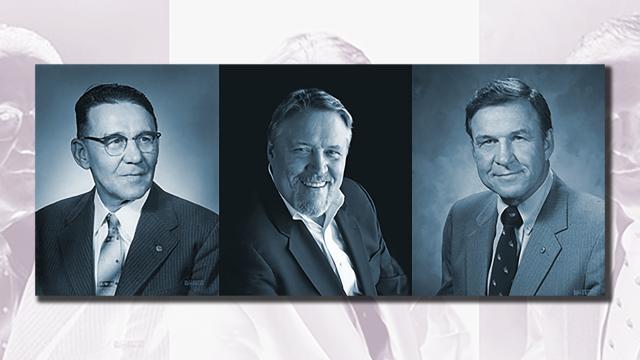
From left to right, Maurice Yost, KC Yost, Ken Yost.
Learn more about Hart Energy Conferences
Get our latest conference schedules, updates and insights straight to your inbox.
I first met KC Yost Jr. soon after becoming editor of Pipeline & Gas Journal in 1995. It was at my first visit to the Pipeliners Association of Houston and KC may have been president; I don’t recall. But I do remember the hearty handshake and warm smile with which he greeted me.
Fast forward to today and KC hasn’t changed one bit other than he is in his 60s. He still retains an enthusiasm for his work and life in general that quickly fills into those around him. He would make one heck of a politician. But pipelining? I’ve met thousands of pipeliners during my career, but none who can share the Yost legacy. KC is a third generation pipeliner, continuing a century’s worth of contributions in pipeline design and construction.
For it was exactly 100 years ago that grandfather, Maurice Yost, started pipelining in and around Sistersville, W. Va., for a company that would become Hope Natural Gas Co. Maurice worked his way from teamster to truck driver to mechanic, retiring in 1960 as company chief mechanic. His son, Ken Yost, joined Hope Gas as a laborer in 1952 after returning from the South Pacific and receiving his electrical engineering degree from West Virginia University.
Ken moved into gas measurement in the mid-1950s, was on the AGA 3 Committee for several years, and became a leading advocate for thermal measurement of natural gas in the 1960s and 1970s. He will turn 92 in December and retired from CNG, (Consolidated Natural Gas, a successor to Hope Gas) as an executive vice president in 1987.
For KC, a career in the oil and gas business was seemingly set. His piece of the family legacy began in 1976. Today he is onshore director at Cronus Technology Inc. It’s KC’s story to tell in this interview with Hart Energy.
“I suppose the short answer is that the apple doesn’t fall far from the tree in my family,” said KC, explaining how each of the Yosts found their way into the petroleum business. “It’s interesting how some families just become part of an industry and the industry becomes part of them, whether we know it or not.
“My father and grandfather spent their entire careers working essentially for the same natural gas company. They spent many long hours away from home on the right-of-way or at the compressor station, helping build a pipeline system that extended from West Virginia into Ohio, Pennsylvania, and New York.
“As a boy and through high school, I occasionally traveled with my father on business trips. He took me to meter/regulator stations, compressor stations, and out on the right-of-way. I found it interesting but never got overly excited about the business. It wasn’t until I moved to Houston and could get out on the right-of-way as an employee that I recognized just how exciting it could be to design and build pipelines.
“Tennessee Gas Pipeline’s Engineering Training Program let me experience almost every aspect of pipeline design, construction, and operations. They nurtured the seed implanted when I was a boy. I’ve enjoyed a variety of challenges in my career. That’s why I’ve never lost that enthusiasm I felt for the industry in 1976,” KC said.
It turns out that KC’s petroleum industry roots extend even further back than ‘Papaw’ Maurice. What we have here is an actual lesson in our industry’s history.
“My grandfather grew up in Hanford City, W. Va., a small community south of Sistersville, W. Va.. His father, Harvey Yost, serviced production wells along the Ohio River for Carter Oil Co., which was acquired by Standard Oil of New Jersey around 1905,” KC said. “As a boy, my grandfather developed a very strong love of animals. By the time he was a teenager (he dropped out of school after third grade), he was working for a company that provided teams of horses for the oil and gas industry.
“Among their clients was Carter Oil Co., by now a subsidiary of Standard Oil. After a few years running contract teams for Carter Oil, he joined Harvey as an employee of Carter in 1919. At Carter, my grandfather was a construction laborer and a teamster…anything the company needed to get product from the well to the market. In 1922,” KC continued, “Hope Natural Gas Co. (also a subsidiary of Standard Oil) was expanding in West Virginia. My grandfather’s uncle headed the expansion and offered him a job as a teamster.
“He accepted the offer and from teamster to truck driver to mechanic, he worked very hard to help get pipe in the ground. Because both Carter and Hope were subsidiaries of Standard Oil, my grandfather carried his three years of seniority with Carter over to Hope. He retired from Hope in 1963 with 44 years’ service.”
Meanwhile, KC’s father was also eying a career in oil and gas. After graduating from WVU, Ken was offered a job at the local electric utility but chose instead to work at the gas company.
“I suspect his decision had as much to do with the loyalty Hope Gas showed to its employees (and my family in particular) through the Great Depression and war years as anything else. My grandfather was very well-liked and respected at the gas company. I’m sure his service to Hope Gas made hiring dad easy for the company. Dad has often commented that professionally, he worked as hard to protect my grandfather’s reputation as he did to establish his own,” KC said.
Maurice and Ken always preferred to downplay their accomplishments, KC said.
“As I understand, my grandfather thought most people would think his job wasn’t very exciting and wouldn’t be interested in his experiences. He only shared a few stories with us. Dad is cut from the same cloth. He wrote his memoirs in 2009 and devoted six pages to his professional career. Only one sentence discussed his advancement in the company and his management responsibilities. He also only wrote one sentence to mention community and industry association participation as well even though he was heavily involved with community development.
“I believe they were most proud of doing their best at whatever assignment they were given. My grandfather was also proud of doing whatever it took to get his family through the Great Depression. By then, he was a mechanic for Hope Gas, repairing cars on the side, and working in the company “Depression” garden (Hope Gas had set aside a plot of land in Clarksburg where employees could plant and grow vegetables).
“I’m very proud knowing that my grandfather was among the pioneering team of pipeliners developing the natural gas fields in West Virginia. I’m also proud of my father helping build a foundation for natural gas measurement. He was heavily involved in pioneering meter and compressor station automation in the late 1950s. I believe his greatest contribution was his involvement in the development of thermal measurement of natural gas,” KC said.
They may not have realized it, but Maurice and Ken could be quite the story tellers.
“My grandfather told about working with horses as a young teamster. He was assigned a team with one very dominant lead horse. Whenever he was in the stall, the horse used to pin him up against the wall as he had with previous teamsters. My grandfather’s solution was to whittle and attach wooden spikes to the wall. As the horse would try to pin him, my grandfather would stand against the wall in between the spikes. The horse would feel the spikes before pinning him. After a few bouts, they came to terms and worked well together,” so the story goes.
Maurice Yost once told KC about driving in the 1920s on horrendous roads in trucks that were less than reliable. “I believe someone lost their car into the Ohio River because brakes weren’t working well on a tractor pulling three wagons loaded with pipe. The tractor and wagons came down off the hill, couldn’t stop, hit the car, and sent it into the river.”
Many of the conversations came as KC helped his grandfather cut hay on the hillside at his farm. “I thought he liked the conversations,” KC recalled, “and maybe he did. But I was really there to work as a counterbalance on his tractor to keep it from tipping over as he cut along the side hill.
“Dad and I have talked about his early days as a ‘contingent’ employee. One job was applying coating and tape wrap to pipelines before being buried. This was a one-man operation where he would wire brush and paint a bitumen-based liquid on the pipe joint after welding, then immediately tape wrap the joint, and follow up with another coat of the bitumen liquid. I asked him what the curing time was for the coating. He didn’t know, as the foreman had the pipe buried right away. Cathodic protection wasn’t highly regarded by everyone in the industry at the time,” KC said.
The mountainous terrain has left West Virginia among the poorest states with a historic lack of job opportunities. This is gradually changing thanks to the shale revolution which has seen West Virginia become a focal point of the Marcellus. Petroleum provided similar opportunities to the Yosts 100 years ago.
“The pipeline industry was extremely important to my grandparents during the Depression,” KC said. “My grandfather was able to keep a steady job, have side jobs, and work in the company garden. Because of the proximity of my grandparents’ house to the company shop, my grandmother was able to board mechanics when they were in town for repairs to their trucks. The job opportunities and networking helped them get through those tough years.
“Having a steady job was also important for my parents...children of the Depression. Working at Hope Gas and CNG allowed them a secure future. That’s the way it was during those times. Becoming an employee of an operating company was, for all intents and purposes, a lifetime commitment for both the employee and the company,” KC said.
“Both my father and grandfather worked on several construction sites, helping the company grow. Those of us that are a generation removed from the Depression don’t make that commitment as strongly as our parents did. Nor do many companies in the energy industry reciprocate the same commitment.”
After discussing the Yost family’s history, KC eagerly looks forward to what he feels is a promising outlook for the pipeline industry.
“I feel the pipeline industry has a bright future. Domestically, getting new plays to market (the Permian for example) and maintaining the existing infrastructure will keep the next generation of pipeliners busy for a good while. Internationally, there are always opportunities for those who are interested. It’s important that we all recognize the industry is cyclical….as many industries are.”
And some words of wisdom to the next generation.
“Young people getting into the pipeline business need to absorb as much as they can in their early years. Gain credentials, experience, and a reputation (this industry is built on relationships). Be patient. Take advantage of opportunities when they present themselves. Aspirations are great but building a strong foundation by paying dues will help once those supervisory positions are reached. My grandfather used to say, ‘A person needs to start at the small end of the horn in order to come out the big end.’
Recommended Reading
BP: Gimi FLNG Vessel Arrival Marks GTA Project Milestone
2024-02-15 - The BP-operated Greater Tortue Ahmeyim project on the Mauritania and Senegal maritime border is expected to produce 2.3 million tonnes per annum during it’s initial phase.
Deepwater Roundup 2024: Offshore Africa
2024-04-02 - Offshore Africa, new projects are progressing, with a number of high-reserve offshore developments being planned in countries not typically known for deepwater activity, such as Phase 2 of the Baleine project on the Ivory Coast.
TotalEnergies Starts Production at Akpo West Offshore Nigeria
2024-02-07 - Subsea tieback expected to add 14,000 bbl/d of condensate by mid-year, and up to 4 MMcm/d of gas by 2028.
E&P Highlights: Feb. 5, 2024
2024-02-05 - Here’s a roundup of the latest E&P headlines, including an update on Enauta’s Atlanta Phase 1 project.
CNOOC’s Suizhong 36-1/Luda 5-2 Starts Production Offshore China
2024-02-05 - CNOOC plans 118 development wells in the shallow water project in the Bohai Sea — the largest secondary development and adjustment project offshore China.

